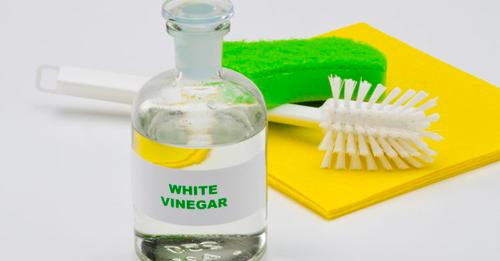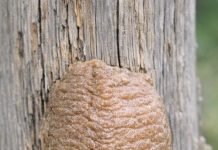If you’ve spent any time poking around on household blogs, you’ve quickly realized that regular white vinegar is apparently some sort of miracle substance. Many people claim that it can clean almost anything:
laundry, windows, floors, bathrooms, mirrors, and more.
With all this praise, you might start to think that vinegar has descended to earth in a golden cloud as a gift from the gods! All that said, it’s not like vinegar is a magical panacea. In fact, there are some things we absolutely should not clean with vinegar. In fact, even ordinary white vinegar is a pretty strong acid that can corrode or react with many common materials.
- Cast Iron
Many cast-iron-cookware-users talk with pride about the “seasoning” that develops on the iron overtime. It’s actually a layer of oil that keeps the cookware nonstick. Soap is a no-no for cleaning cast iron, since it will strip this seasoning right off. Vinegar has the same effect. Not only that, the acid in vinegar will react with the iron itself, causing it to rust.So you definitely do not want to use vinegar to clean your cast iron! Instead, try gently scrubbing the cookware clean with water, a little kosher salt, and a towel.
- Irons
If vinegar reacts with the iron in cast iron cookware, then it stands to reason that it will also react with iron in …. irons. As in the kind you press your clothes with. Some blogs suggest pouring vinegar into an iron’s water reservoir to clean it, but this can damage the metal parts. If you’re worried about deposits building up inside your iron, used distilled instead of tap water.
- Carbon Steel Knives
Vinegar can cause carbon steel to darken and/or become blotchy. Some people like the look of a “patina” on their knives, but if you want to keep yours shiny and new, avoid cleaning them with vinegar.
- Aluminum
Vinegar reacts with aluminum, too. Aluminum won’t rust like iron, but vinegar will give it spots and blotches. I know–I ruined a favorite moka pot after trying to clean it with vinegar!
- Touchscreens
It turns out that smartphones, tablets, and similar devices actually have a coating on their touchscreens that is fingerprint-resistant. Cleaning the screen with vinegar can strip this coating off. Instead, just use water and a microfiber cloth to polish it.
- Hardwood Floors
manufacturers say that cleaning the wood with vinegar will damage its protective and beautifying finish. You might as well just scrub it with sandpaper! Use an approved flooring cleaner instead.
- Waxed Wood
Many cabinets and some other wood surfaces (including some floors) have waxed-based finishes. Keep vinegar away from these for the same reason.
- Washing Machines
The jury’s out on this one. Many people suggest that vinegar is great for cleaning clothes, and can also clean and disinfect a washing machine itself. On the other hand, others say that the vinegar can damage the rubber hoses that connect the washer to plumbing. Check with your machine’s manufacturer if you want to be sure!
9- Unsealed Grout
10- Egg Stains
11- Tough Carpet Stains
12- Stone Surfaces
Sources:
The Kitchn
Better Homes and Gardens
The Spruce
Country Living










